Les films ayant le thème "Adaptation d'un opéra", triés par recette
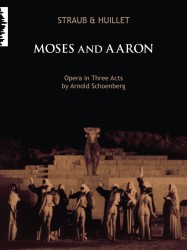
Moïse et Aaron (1975)
, 1h45Réalisé par Jean-Marie Straub et Danièle Huillet
Origine Autriche
Genres Drame, Musical
Thèmes La musique, Religion, Musique, La bible, Religion juive, Adaptation d'un opéra
Moïse, conscient de sa difficulté à communiquer, demande à Aaron d'être son porte-parole lorsque Dieu lui ordonne de libérer le peuple. Un dialogue s'établit entre les deux hommes dont les conceptions et les mentalités diffèrent.
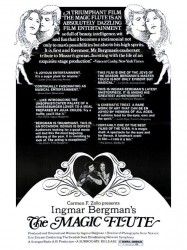
La Flûte enchantée (1975)
, 2h15Réalisé par Ingmar Bergman
Origine Suede
Genres Drame, Science-fiction, Comédie, Fantasy, Musical, Romance
Thèmes Magie, La musique, Musique, Adaptation d'un opéra
Acteurs Ingmar Bergman, Jane Darling, Erland Josephson, Birgit Nordin, Sven Nykvist, Liv Ullmann
La Reine de la nuit demande au prince Tamino de retrouver sa fille Pamina, qui a été enlevée par un prêtre nommé Sarastro. Le prince part avec Papageno, un oiseleur. Lorsqu'ils retrouvent la princesse, ils découvrent que la situation n'est pas aussi tranchée que le disait la reine. Sarastro accepte l'union de Tamino et Pamina à condition qu'ils réussissent chacun leur parcours initiatique.

Don Giovanni (1979)
, 3h4Réalisé par Joseph Losey
Genres Drame, Musical
Thèmes La musique, Musique, Adaptation d'une pièce de théâtre, Adaptation d'un opéra
Acteurs Ruggero Raimondi, Lorin Maazel
Se reporter à l'article sur l'opéra homonyme.

Cavalleria rusticana (1982)
, 1h10Réalisé par Franco Zeffirelli
Genres Comédie musicale, Musical
Thèmes La mer, Transport, Musique, Adaptation d'un opéra
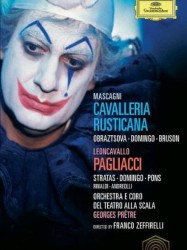
Pagliacci (1982)
, 1h12Réalisé par Franco Zeffirelli
Origine Italie
Genres Drame, Comédie musicale, Musical
Thèmes La musique, Musique, Adaptation d'un opéra
The story is set in southern Italy and recounts the tragedy of Canio, the lead clown (or pagliaccio in Italian) in a commedia dell'arte troupe, his wife Nedda, and her lover, Silvio. When Nedda spurns the advances of Tonio, another player in the troupe, he tells Canio about Nedda's betrayal. In a jealous rage Canio murders both Nedda and Silvio. Although Leoncavallo's opera was originally set in the late 1860s, Zeffirelli's production is updated to the period between World War I and World War II.

L'Opéra des gueux (1953)
, 1h34Réalisé par Peter Brook
Origine Royaume-uni
Genres Historique, Musical, Policier
Thèmes La musique, Théâtre, Musique, La peine de mort, Adaptation d'une pièce de théâtre, Adaptation d'un opéra
Acteurs Laurence Olivier, Dorothy Tutin, Hugh Griffith, George Rose, Stuart Burge, Stanley Holloway
L'Opéra des gueux est une histoire de voyous, un peu cocasse. Elle raconte les déboires de Macheath, dénoncé par le receleur Peachum et condamné à être pendu.
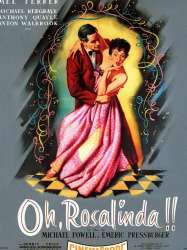
Oh ! Rosalinda ! (1956)
, 1h41Réalisé par Michael Powell, Emeric Pressburger
Origine Royaume-uni
Genres Comédie dramatique, Musical
Thèmes La musique, Musique, Adaptation d'un opéra, Adaptation d'une opérette
Acteurs Michael Redgrave, Mel Ferrer, Anthony Quayle, Dennis Price, Ludmila Tcherina, Anton Walbrook
Comédie inspirée de l'opérette "La Chauve-Souris" de Johann Strauss, l'action se passant à Vienne en 1955.

Parsifal (1982)
, 4h15Réalisé par Hans-Jürgen Syberberg
Genres Drame, Musical
Thèmes La musique, Musique, Adaptation d'un opéra
Acteurs Edith Clever, David Meyer

Carmen (1983)
, 1h42Réalisé par Carlos Saura
Origine Espagne
Genres Drame, Comédie musicale, Musical, Romance
Thèmes Danse, La musique, Musique, Adaptation d'un opéra
Acteurs Laura del Sol, Marisol, Cristina Hoyos
Un groupe de danseurs de flamenco met en scène une version très hispanisée de l'œuvre de Prosper Mérimée. Durant les préparations et l'exécution de l'œuvre, Antonio, le chorégraphe, tombe amoureux de Carmen qui en est la danseuse principale. L'œuvre dansée et la vie réelle commencent alors à se mêler.

Aida (1987)
, 1h35Thèmes Afrique post-coloniale, La musique, Musique, Adaptation d'un opéra
Acteurs Niklas Ek

Macbeth (1987)
, 2h13Réalisé par Claude d'Anna
Origine France
Genres Musical
Thèmes La musique, Musique, Politique, Adaptation d'une pièce de théâtre, Adaptation d'une pièce de théâtre de William Shakespeare, Adaptation d'un opéra, Royauté
Acteurs Johan Leysen, Philippe Volter

Boris Godounov (1989)
, 1h55Réalisé par Andrzej Żuławski
Origine Espagne
Genres Drame, Historique, Musical
Thèmes La musique, Musique, Adaptation d'un opéra
Acteurs Ruggero Raimondi, Delphine Forest, Anne-Marie Pisani, Galina Vishnevskaya
Chambellan d'Ivan le Terrible, Boris Godounov exerce ensuite la régence pour Fédor Ier. À la mort de ce dernier, Boris Godounov devient tsar.

Le Prince de Hombourg (1997)
, 1h29Réalisé par Marco Bellocchio
Origine Italie
Genres Drame, Historique, Romance
Thèmes La musique, Musique, Adaptation d'une pièce de théâtre, Adaptation d'un opéra
Acteurs Andrea Di Stefano, Barbora Bobulova, Toni Bertorelli, Pierfrancesco Favino, Bruno Corazzari
Le prince de Homburg désobéit aux ordres et mène une charge de cavalerie dans la bataille contre les Suédois, qui mène à la victoire. Il est cependant traduit en cour martiale pour avoir désobéi aux ordres et condamné à mort. Sa bien aimée, désormais fiancée au roi de Suède, fait appel auprès de l'Électeur, son oncle, ainsi qu'à ses camarades de bataille. Il doit également faire face à son propre désir de vivre et à un sens contradictoire de l'honneur.

H-E Double Hockey Sticks (1999)
, 1h36Réalisé par Randall Miller
Origine Etats-Unis
Genres Comédie
Thèmes La musique, Sport, Hockey sur glace, Musique, Adaptation d'un opéra
Acteurs Will Friedle, Matthew Lawrence, Gabrielle Union, Shawn Pyfrom, Tara Spencer-Nairn, Kim Greist
Satan, in the form of Ms. Beelzebub (Rhea Perlman), sends apprentice demon Griffelkin (Friedle) to Earth's surface to steal the soul of a hotshot young hockey player named Dave (Lawrence), who aspires to be the youngest man to ever win the Stanley Cup.
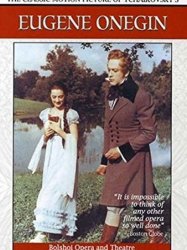
Eugene Onegin (1959)
, 1h48Genres Drame, Musical, Romance
Thèmes La musique, Musique, Adaptation d'un opéra
Acteurs Ariadna Shengelaya, Svetlana Nemoliaïeva, Galina Vishnevskaya
Eugene Onegin, a jaded young dandy from the big city of St. Petersburg, travels to the country to ingratiate himself into the affection of a dying uncle. There he meets the idealistic and romantic poet Vladimir Lensky, who introduces him to the daughters of a local landowner: Olga, with whom Lensky has strong affections, and Olga's younger sister Tatyana. Tatyana falls in love with Onegin. She writes him a letter pledging her love to him and telling him that she "is his." But Onegin rejects her in a polite, but cold and condescending sermon.
[...]Voir plus...
 Connexion
Connexion